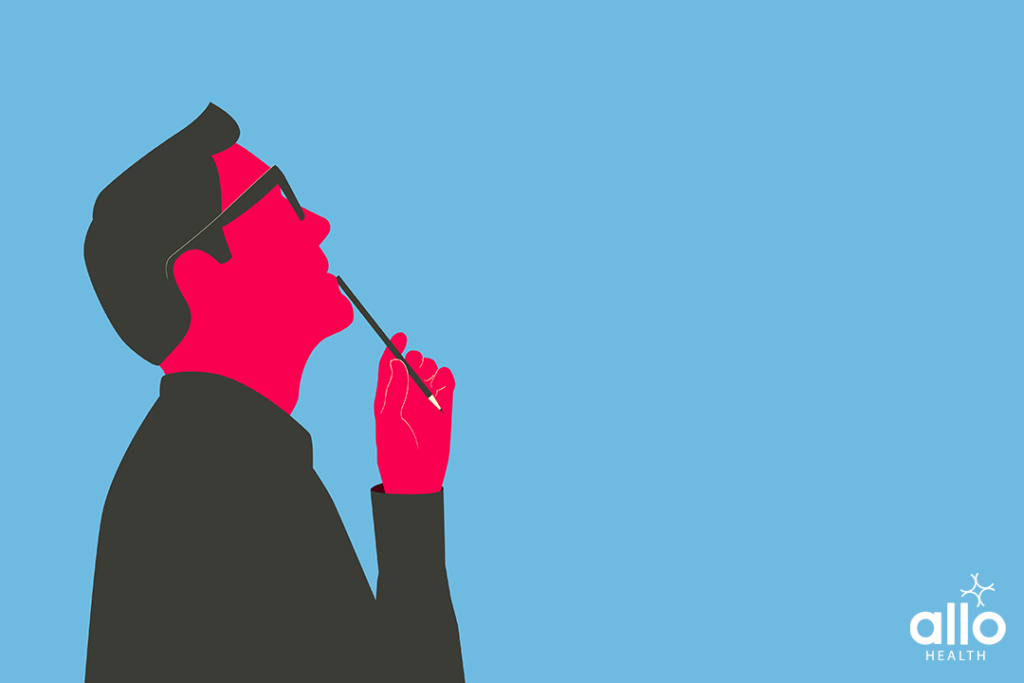Low Libido In Men

Allo Health is dedicated to personalized well-being, offering support and trusted information tailored to individual health goals. The platform emphasizes human-generated content, led by a distinguished medical team of experts, including physicians and sexual health specialists. Their commitment to credibility involves rigorous fact-checking, authoritative research, and continuous updates to ensure accurate, up-to-date information. Allo Health's unique approach goes beyond conventional platforms, providing expert-led insights and a continuous commitment to excellence, with user feedback playing a crucial role in shaping the platform's authoritative voice.

An early career psychiatrist with extensive experience in general adult psychiatry, relationship issues, psychosexual problems & special interest in sexual medicine, disorders with addictive behaviours and Obsessive Compulsive disorders. He is an astute physician with excellent academic record and research experience. He is also a member of World Health Organisation and World Psychiatric Association. His vision and goal for Allo is an inclusive, accessible digital health clinic for psychosexual difficulties.
Why This Was Upated?
Our experts continually monitor the health and wellness space, and we update our articles when new information became available.
Updated on 24 May, 2024
- Article was updated as part of our commitment to diversity, equity, and inclusion.

"The following blog article provides general information and insights on various topics. However, it is important to note that the information presented is not intended as professional advice in any specific field or area. The content of this blog is for general educational and informational purposes only.
Book consultation
The content should not be interpreted as endorsement, recommendation, or guarantee of any product, service, or information mentioned. Readers are solely responsible for the decisions and actions they take based on the information provided in this blog. It is essential to exercise individual judgment, critical thinking, and personal responsibility when applying or implementing any information or suggestions discussed in the blog."
What Is Low Libido In Men?
Low libido or loss of libido in men, also known as hypoactive sexual desire disorder, is a condition characterized by a lack of interest in sexual activity. It is a common condition that affects men of all ages and can have a significant impact on a man’s quality of life.
Causes of Low Libido In Men
There are a number of potential causes of low libido in men. Physical causes can include low levels of testosterone, erectile dysfunction, chronic illnesses such as diabetes or heart disease, and certain medications. Psychological causes can include stress, depression, anxiety, and relationship concerns.
Symptoms of Low Libido In Men
Low libido, or a decreased interest in sex, is a common concern among men. Many factors can contribute to low libido, including physical, psychological, and lifestyle-related concerns. Understanding the different types of symptoms associated with low libido in men can help individuals identify the root cause of their concern and seek appropriate treatment.
Physical symptoms of low libido in men include:
- Erectile dysfunction (ED)
- Premature ejaculation, and difficulty maintaining an erection.
These symptoms may be caused by underlying health conditions such as diabetes, heart disease, or hormonal imbalances.
Psychological symptoms of low libido in men include:
- Anxiety
- Depression
- Stress
These symptoms can be caused by a variety of factors, including work-related stress, relationship concerns, or past sexual trauma.
Lifestyle-related symptoms of low libido in men include:
- Poor diet
- Lack of exercise
- Excessive alcohol consumption
These symptoms can be caused by a variety of factors, including a sedentary lifestyle, unhealthy eating habits, and excessive alcohol consumption.
Treatment of Low Libido In Men

Treatment?for low libido in men can vary depending on the underlying cause. For physical causes, treatment may include testosterone replacement therapy, medication to treat erectile dysfunction, or changes to medication. For psychological causes, treatment may include therapy, counseling, or medication to treat depression or anxiety.
There are several treatments available to help men with low libido.
- Hormone therapy: Low levels of testosterone can lead to low libido in men. Hormone therapy can help to restore testosterone levels (testosterone therapy) to normal and improve sexual desire.
- Medications: Certain medications, such as Viagra and Cialis, can help to improve blood flow to the penis and enhance sexual function.
- Counselling: Psychological factors such as stress, anxiety and depression can contribute to low libido in men. Talking to a therapist or counselor can help to address these concerns and improve sexual desire.
- Lifestyle changes: Making changes to your lifestyle, such as exercising regularly, eating a healthy diet, and quitting smoking can improve overall health and boost libido.
In addition to addressing any underlying physical or psychological causes, there are also several lifestyle changes that can help boost libido. These include:
- Eating a healthy diet: A diet that is high in fruits, vegetables, and lean protein can help improve overall health, including sexual health.
- Getting regular exercise: Regular physical activity can help improve circulation and boost energy levels, which can in turn improve libido.
- Managing stress: Stress can have a major impact on sexual desire, so finding effective ways to manage stress, such as through meditation or therapy, can be important.
- Limiting alcohol consumption: Excessive alcohol consumption over long periods of time can lower libido, so it’s a good idea to limit your alcohol intake if you’re experiencing low libido.
Most Asked Questions
-
What causes low libido in men?
Low libido in men can be caused by a variety of factors, including physical, emotional, and psychological concerns. Physical causes can include low testosterone levels, certain medical conditions, and certain medications. Emotional and psychological causes can include stress, anxiety, depression, and relationship concerns.
-
How can I tell if I have low libido?
If you are experiencing a decreased desire for sexual activity, it is possible that you have low libido. Other signs of low libido can include difficulty becoming aroused, difficulty achieving or maintaining an erection, and difficulty reaching orgasm. If you are experiencing any of these symptoms, it is important to speak with your healthcare provider to determine the cause.
-
Is low libido a sign of a serious health condition?
Low libido can be a symptom of a serious health condition, such as depression, diabetes, or heart disease. It can also be a side effect of certain medications. If you are experiencing low libido, it is important to speak with your healthcare provider to determine the cause and to rule out any underlying health conditions.
-
Can low libido be treated?
Low libido can be treated, depending on the cause. If the cause is physical, such as low testosterone levels, hormone replacement therapy may be prescribed. If the cause is emotional or psychological, counseling or therapy may be recommended. In some cases, a combination of treatments may be necessary.
-
How balanced diet can help with a decrease in Libido In Men?
A balanced diet is essential for maintaining overall health and well-being, and it can also play a significant role in addressing low libido in men. Low libido, or a decreased interest in sexual activity, can be caused by a variety of factors, including hormonal imbalances, stress, and certain medical conditions. However, research has shown that certain nutrient deficiencies can also contribute to low libido. Zinc: Zinc plays a vital role in the production of testosterone, the primary male sex hormone, and a deficiency in zinc can lead to low testosterone levels and decreased libido. Foods that are high in zinc include oysters, beef, chicken, and pumpkin seeds. Vitamin B: Vitamin B is essential for the production of red blood cells and maintaining proper nerve function. A deficiency in vitamin B can lead to fatigue, depression, and decreased libido. Foods that are high in vitamin B include fish, eggs, leafy greens, and nuts. In addition to zinc and vitamin B, a balanced diet should also include a variety of fruits and vegetables, lean proteins, and healthy fats. These foods provide essential nutrients, antioxidants, and phytochemicals that can help to improve overall health and support the body's natural processes. Note that too much alcohol intake, smoking and an unhealthy lifestyle also can have negative effect on sexual health. Therefore, a balanced diet along with regular exercise, stress management and healthy lifestyle is the key to maintaining good sexual health.
-
Can cancer treatments causes low libido in men?
Yes, cancer treatments such as chemotherapy and radiation therapy can cause low libido in men. These treatments can affect the production of hormones in the body, which can lead to changes in sexual function. In addition, the physical and emotional side effects of cancer treatment can also contribute to low libido. It's important to discuss any concerns about sexual function with a healthcare provider during and after cancer treatment.
-
How does Psychosomatic Stress cause low libido in men?
Psychosomatic stress refers to the connection between psychological factors and the physical symptoms that they can cause. Stress can have a major impact on a person's sexual function, including low libido. When a person is under stress, their body releases stress hormones such as cortisol and adrenaline. These hormones can interfere with the production of testosterone, which is an important hormone for sexual function in men. Additionally, stress can also lead to fatigue, depression and anxiety, all of which can contribute to low libido. Chronic stress can also affect a person's relationships and emotional well-being, which can also contribute to low libido. Stress can cause feelings of anxiety and depression, which can affect a person's motivation and desire for sexual activity. Stress can also cause a person to feel less connected to their partner, which can make it difficult to feel desire for sexual activity. Lastly, stress can also disrupt sleep which can contribute to low libido. Lack of sleep can cause fatigue, which can make a person less interested in sexual activity, and can also affect the body's production of hormones that are important for sexual function.
-
How does poor body image cause low libido in men?
Poor body image can cause low libido in men by affecting a person's self-esteem and self-worth. When a person has negative feelings about their body, they may feel less attractive and less confident in their sexual abilities. This can lead to a lack of desire for sexual activity, as well as difficulty becoming sexually aroused. Poor body image can also cause anxiety and depression, which can also contribute to low libido. It can also make a person feel self-conscious during sexual activity, which can make it difficult to relax and enjoy the experience. Additionally, poor body image can also lead to avoidance of sexual activities and situations which can further decrease interest in sexual activities. To address any negative feelings about one's body and work on developing a more positive body image. Some ways to improve body image include: Engage in regular physical activity and exercise Focus on self-care Surround oneself with positive influences Seek help from a therapist or counselor if needed Remember that everyone's body is different and that there is no one "perfect" body type. It's important to focus on self-acceptance and self-love, rather than trying to conform to societal standards of beauty.
-
How does poor increased body mass cause low libido in men?
Increased body mass, or obesity, can cause low libido in men through several mechanisms. Firstly, obesity can lead to hormonal imbalances in the body. It can decrease the levels of testosterone, which is an important hormone for sexual function in men. Low levels of testosterone can lead to a decrease in libido, as well as difficulty achieving and maintaining an erection. Secondly, obesity can also lead to physical health concerns, such as diabetes and cardiovascular disease, which can also contribute to low libido. These conditions can affect the blood flow to the genitals, making it more difficult to achieve and maintain an erection. Thirdly, obesity can also lead to psychological concerns such as low self-esteem, depression, and poor body image, which can also contribute to low libido. Finally, obesity can also lead to fatigue and lack of energy, which can make a person less interested in sexual activity. To address any health concerns related to obesity, and to work on achieving and maintaining a healthy weight. This can be done through a combination of regular physical activity, healthy eating, and working with a healthcare provider. Remember that a person's worth is not defined by their weight or body size, and to focus on self-acceptance and self-love.
-
How do bad exercise habits cause low libido in men?
Bad exercise habits can cause low libido in men through several mechanisms. Firstly, overtraining, or engaging in excessive and intense physical activity, can lead to hormonal imbalances in the body. Overtraining can lead to an increase in the stress hormone cortisol and a decrease in testosterone levels, both of which can contribute to low libido. Secondly, lack of exercise or a sedentary lifestyle can also lead to low libido. Regular physical activity helps to improve blood flow, including blood flow to the genitals, which can help to improve sexual function. Inactivity can lead to decreased cardiovascular health and decreased blood flow which can affect sexual function. Thirdly, bad exercise habits can also lead to injury or muscle strain which can cause pain and discomfort during sexual activities. Lastly, bad exercise habits can also lead to fatigue, lack of energy and poor body image which can also contribute to low libido. To engage in regular physical activity, but to do so in a way that is balanced and appropriate for one's fitness level and goals. Consultation with a personal trainer or fitness professional can help to create an exercise plan that is safe and effective. Remember that exercise is just one aspect of overall health and well-being, and that other factors such as sleep, nutrition, and stress management also play important roles in maintaining sexual health.
-
Can thyroid disorders cause low libido in men?
Yes, thyroid disorders can cause low libido in men. The thyroid is a small gland located in the neck that produces hormones that regulate metabolism and energy levels. When the thyroid is not functioning properly, it can lead to a condition called hypothyroidism, which is characterized by an underactive thyroid. This can cause a decrease in testosterone levels, which is an important hormone for sexual function in men. Low levels of testosterone can lead to a decrease in libido, as well as difficulty achieving and maintaining an erection. Additionally, hypothyroidism can also cause fatigue, weight gain, depression, and anxiety, all of which can contribute to low libido. Hyperthyroidism, on the other hand, is characterized by an overactive thyroid, which can also lead to low libido in men. The overproduction of thyroid hormone can lead to decreased testosterone production and can cause fatigue, insomnia, and weight loss, which can also contribute to low libido.
-
Can coronary artery disease cause low libido in men?
Yes, coronary artery disease (CAD) can cause low libido in men. CAD is a condition in which the coronary arteries (the blood vessels that supply the heart) become narrowed or blocked due to the buildup of plaque. This can decrease the blood flow to the heart and other parts of the body, including the genitals. Decreased blood flow to the genitals can make it more difficult for a man to achieve and maintain an erection. This is a condition called Erectile Dysfunction (ED) which is a common complication of CAD. ED can lead to a decrease in libido and make it more difficult to have sexual intercourse. Additionally, CAD can also cause fatigue, chest pain, and shortness of breath, which can make it difficult to engage in physical activity, including sexual activity. CAD can also lead to psychological concerns such as anxiety and depression, which can also contribute to low libido. To address any risk factors for CAD such as high blood pressure, high cholesterol, smoking, and diabetes ; have regular check-ups with a healthcare provider. Treatment options for CAD can include medication, lifestyle changes, and surgery if needed. Remember that ED is not just a symptom of CAD and can be caused by underlying conditions such as diabetes, high blood pressure, and depression, among others. It's important to address any concerns with a healthcare provider and to work together to find the best course of treatment.
-
Can hypogonadism cause low libido in men?
Yes, hypogonadism can cause low libido in men. Hypogonadism is a condition in which the body doesn't produce enough testosterone, which is an important hormone for sexual function in men. Low levels of testosterone can lead to a decrease in libido, as well as difficulty achieving and maintaining an erection. Symptoms of hypogonadism can include fatigue, muscle weakness, decreased bone density, and changes in body composition, as well as sexual symptoms such as low libido, erectile dysfunction and decreased semen volume. There are several causes of hypogonadism, which include congenital conditions, genetic conditions, infections, certain medications, injuries, radiation therapy, and chronic illnesses such as type 2 diabetes and obesity.










































